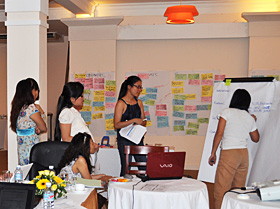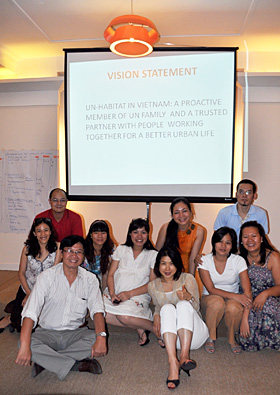 Group discussion
Group discussionOn July 14th-16th, the UN-Habitat Viet Nam team has successfully held a workshop in Cua Dai, Quang Nam Province in preparation of the next UN-Habitat Country Programme Document (HCPD) which aligns with the coming five year socio-economic development plan of Viet Nam (2011-2015) and the development of the next UN One Plan (2012-2016). In compliance with current UN-Habitat's Medium Term Strategic and Institutional Plan (MTSIP), it calls for an enhanced normative and operational framework (ENOF) to enable UN-Habitat to play a leadership and catalytic role in promoting sustainable urbanization in the country.
At the retreat, participants have analyzed the strengths and weaknesses of UN-Habitat in development context and ODA landscape of Viet Nam. In recognizing new opportunities and potential threats, the team discussed UN-Habitat vision and its comparative advantages.
Five UN-Habitat focus areas of (i) Advocacy, monitoring and partnership; (ii) Participation in urban planning, management and governance, (iii) Pro-poor land and housing, (iv)Environmentally sound basic urban infrastructure and services, and (v) Human settlement finance system were also analyzed in a Vietnam context through presentations by UN-Habitat Viet Nam staff. Open and in-depth discussions on thematic areas were benefited from helpful comments by Lowie Rosales, Human Settlements Officer of the Regional Office for Asia and the Pacific (ROAP) and Nguyen Quang, Habitat Programme Manager of Vietnam.
Urbanization is a necessary process in many developing countries, and of course Vietnam is not an exception. While Vietnam has made some significant achievements in economic growth and social development … urban challenges are profound and not easy to solve overnight. Rapid growth with low-skilled labors and low-valued products, the rising of inequality and disparity; inequality in access to income generation opportunities; the constraints to competitiveness of institutional, infrastructure and skills; inadequate protection from fragmented and aggressive social security; persistent chronic poverty, loss of land from rapid urbanization and industrialization; increasing pollution from inefficient production and consumption and effects of climate change are typical challenges that Vietnam has to address and count in future urban plan.
 UNH team
UNH teamUN-Habitat Viet Nam is currently working on three One Plan funded projects including (1) the Quang Nam Provincial Development Strategy, (2) Support for Pro Poor Housing Policies in Vietnam and (3) and Vietnam Urban Observatory System. The project progress have also been reviewed and ideas for future projects, and implementation of effective One UN methodology and funding were brainstormed and discussed.
It was agreed that climate change has become a globally sensitive subject, and there has been a commitment from the Vietnamese government to respond to its potential impact. Although there have been several local initiatives in climate change mitigation and adaptation, little has been done to integrate climate change considerations into urban plans. "We can not do spatial planning for all provinces/cities, but what we can do is providing capacity building, and do research on climate change. In addition, we also can promote the policy to develop climate change resilient infrastructure." Quang said.
Through discussion groups, contributions, a vision statement "UN-Habitat in Vietnam: A proactive member of UN family and a trusted partner working together with people for a better urban life" was agreed among all members.
"I have a vision and a strong belief that Vietnam will become a driving force in the region, and ROAP will support Vietnam to become the regional trailblazer in terms of development." Lowie said.
- Urban Leadership and Innovation Mini-Ba
- Viet Nam plans launch of City Prosperity Index
- Regional Planning and Linkages for Southern Key Economic Zone Workshop in Ho Chi Minh City
- Policy Dialogue on Right to Adequate Housing: Roles of Urban Communities in the Housing Process
- Training on Developing result based Monitoring and Evaluation System in Urban Sector
- Urban Planning for City Leaders
- Initiatives to Promote Local Economic Development
- The World We Want: Listening to the views of poor and marginalized people 2
- The World We Want: Listening to the views of poor and marginalized people 1
- Leadership Training for Sustainable City Development Strategy of Danang
- New collaboration signed aims to support the Government of Viet Nam in the implementation of the Viet Nam Statistical Development Strategy 2011-2020
- United Nations Resident Coordinator leading UN-Habitat delegation to have courtesy visits to Ho Chi Minh National Academy of Politics and Public Administration and Minister of Construction
- Workshop "Capacity Builging to Develop Climate Change Response towards Green-Growth"
- Quang Nam Green Growth Investment Forum (PDF 475KB)
- Training on Multi Sector Investment Planning
- ‘Local to Global’ Art-Craft Industry Dialogues
- Government of Viet Nam and the United Nations signed new One Plan for 2012-2016
- National Workshop on Project "Urban Observatory System in Vietnam"
- Training of Trainers Workshop on Housing Policy Development
- World Habitat Day in Vietnam
- UN-HABITAT, partners hold consultative leadership workshop for Vietnamese Province *Will open a separate file
- Consultative Leadership Workshop for Quang Nam PDS
- Kick-off workshop of 'Climate Change Vulnerability and Adaptation Assessment (VAA) of Hoi An' project as a initial step of integrated approaches to the development of Hoi An Eco-city
- Workshop on Consultation and Technical Assistance to National Housing Development Strategy toward 2020, vision of 2030
- Vietnamese Study Tour in Korea on Low-Income Housing
- Workshop "Urban Indicators and Urban Management in Vietnam"
- International Conference on "Hanoi Millennium: City Past and Future"
- Joint Hoi An Eco-city Scoping Workshop
- A proactive member of UN family and a trusted partner working together with people for a better urban life - Viet Nam team’s motto to set forth the next HCPD




















